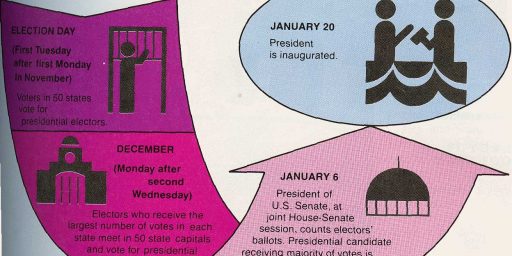Resource Allocation and Health Care
Over at his web site Dave has put up a post discussing how resources are allocated. I’ve touched on this very briefly in comments and a post or two, but nothing this extensive. As such, go read it, it’s good. Here is a snippet,
Despite the author’s attempt to assuage concern by pooh-poohing the idea of rationing, rationing or resource allocation goes on all of the time whether by government, insurance companies, or by the relative preferences of individual healthcare producers and consumers. As long as wants are infinite and supplies are limited there are must be some mechanism for allocating the resource.
There are only three methods of allocating resources: fiat, the political process, and markets.
Needless to say, I tend to prefer the latter. I prefer the last option because it often gives people the best chance to meet their specific wants and needs.





As do I, which is why I support the reform being considered in the House.
And I might add, the public option stands no chance of eliminating the option to seek better options in the private sector.
Obviously there will be a smaller health insurance industry, but it, and those options, will still be there.
To believe otherwise actually shows a tremendous lack of faith in free markets.
But, it’s not the market doing the allocating… it is insurance company bureaucrats.
The question is why rationing by government bureaucrats is inherently worse than rationing by insurance company bureaucrats.
Worse, of course, is that while you choose to use the weasel phrase, “the markets” what you really mean is that health care ought to be rationed by the ability to pay. That is what the market is all about no?
But go shout that from a street corner and see how far it gets you.
The “markets” is nice in theory, but the reality of it is much less palatable.
I prefer the last option (markets) because it often gives people the best chance to meet their specific wants and needs.
Markets are great if you have a job with benefits or enough money to pay your medical and dental bills out of pocket; if not, you’ll get no preventive care, you’ll go to the emergency room, get your medical problems treated and your bad teeth pulled, be presented with an enormous bill on the way out, not be able to pay it, and lose whatever credit you have. America is a great country if you’re a have; it’s not so good if you’re a have-not.
Quite. And it is sad that so many on the right have forgotten these wise words:
I am not a Christian, but this is a brilliant, universal truth.
“”America is a great country if you’re a have; it’s not so good if you’re a have-not.””
“”””””””””””””””””””””””””””””””””””””””””””””””””
Very profound!…I suppose this would be true, even on other planets!
Problem is, Marxism leads to a nation of “have-nots”!
Since no one is advocating Marxisim, that is not a problem. Of course there will always be peanut heads eager to parrot anything they hear on right wing talk radio…
Have you read the article in the WaPo “myths about health care in the rest of the world”?
For proper comparison with other countries; system, you have to distinguish between the ones where one organisation/the State does it all (beveridge system, like the NHS in the UK), and the “Bismarck systems” where there are a lot of insurance organisations, who are organisationally independent of healthcare providers (Germany, France, the Netherlands).
I prefer markets because they are generally more efficient and work well with our native sense of fairness.
There are exceptions though. I wouldn’t want to live in a US with market-based education, and with the kind of permanent underclass that would encourage.
Which is health care? Is it a general case or an exception?
Well, it goes back to ponies and ice cream. It probably works out OK if the children of the rich get more ponies and more ice cream. It doesn’t strike us as terribly unfair. There aren’t enough ponies for everybody, and someone’s got to get them.
… but health care, not so much.
When you want to make sure everybody gets some, the market is not the natural solution.
Bernard,
I don’t advocate just a market based system for delivering health care. As far back as 2006 I’ve argued that such a system, at the very least, would be politically impossible. As such, I’ve been in favor of a hybrid system.
Can you get that through your bald head?
Stan,
See my comment to Bernard. I don’t advocate, for health care, a purely market based system…haven’t done so for years.
Really.
No, really.
Do I need to hit you with a clue-by-four or something?
Odograph,
Yes, and LAUSD is soooo much better. Don’t think that vouchers with competition could help? Maybe?
Anjin san;
And you can’t even convince a peanut head,…. how disappointing it must be for a man with a brain the size of a planet!
Only your superior cognitive powers could conger up an illusion as lovely as the Emperor’s latest Fascion statement!…..
It’s the underwear that’s Marxist!
[Where the sycophant left keeps it’s nose, the odor of “skid Marx” should be obvious!]
Yes, and LAUSD is soooo much better. Don’t think that vouchers with competition could help? Maybe?
Apparently even the LAUSD School Board sees the sense of competition:
I am not bald. I shave my head to be stylish.
Okay I’m bald shoot me.
I apologize for assuming that when you said you favored the market allocating health care that you meant you favored the market allocating health care. We bald people are not smart enough to distinguish between the two. Might you be willing to indulge little brains like me and explain WTF your post was supposed to imply. Dumb bald people like me need it spelled out. Write it as if you were addressing a child.
Steve: Agreed. I am lost in the wilderness, just exactly WTF is your proposed solution? Markets is what we got…. and we have very little choice (these are the doctors you may choose from), rationing (seen a doctor lately? I haven’t. I go to a Nurse Practioner), Have a beaurocrat come between me and my doctor???? (read the above… and beleive me, it gets worse, much worse)
And I am one of the lucky ones (I have a Union job and we put a lot of money into our health care)(it ain’t enuf) … (I fear for those who don’t have the advantages I do)
Ps: there is a 4th option: the political process AND money.
When has money (enuf) failed to overcome an obstacle?